Online and onstage, Jeremy Hunter helps carry the genre’s torch
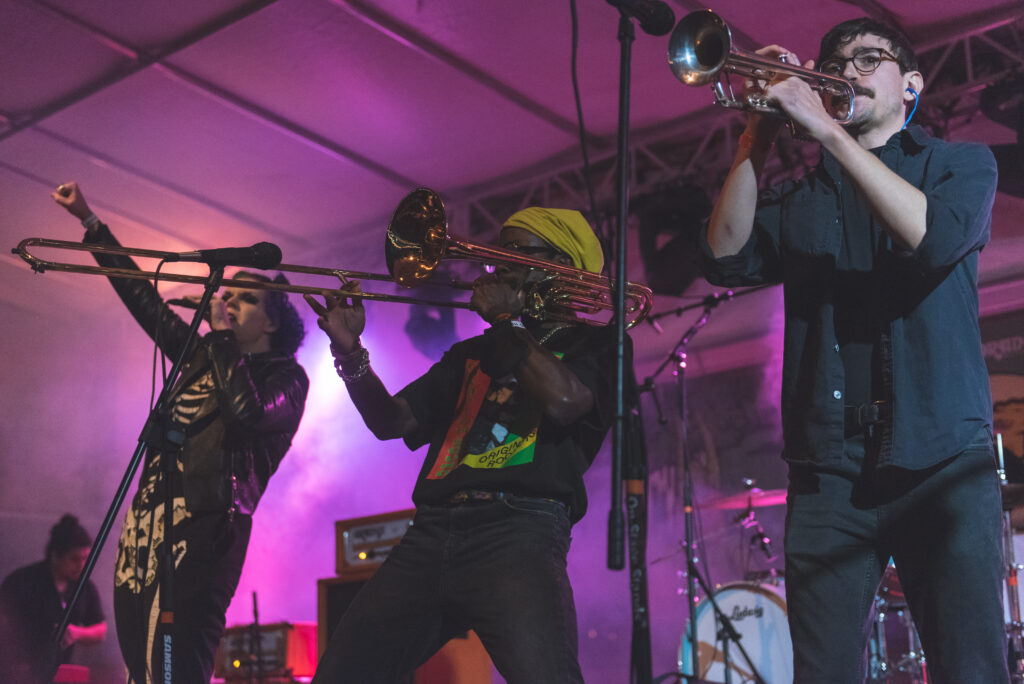
Jeremy Hunter (center) plays trombone for We Are The Union during FEST 19. (Photo by Lorien Lamarr)
December 20, 2021 | Story by Julián de Sevilla
Jeremy Hunter’s house was too quiet. At 11 a.m. Thursday before FEST, the punk festival that takes over downtown Gainesville on the last weekend of October, Hunter still had dozens of songs to rehearse. But all I heard was pouring rain as I stepped onto the porch.
Two strangers politely invited me in. We quickly got acquainted: Matt Hull plays trumpet, Devon Kay plays guitar, I’m the writer. Like Hunter, they were poised for a busy weekend. Like me, they weren’t sure where Hunter was.
Hunter, who is 26 and whose pronouns are they/them, arrived 20 minutes later dressed in a striped T-shirt, black jeans and Reeboks, their arms full of food. They distributed iced coffees and sandwiches to their bandmates, most of whom had arrived at that point. I’d failed to consider the concept of “punk time,” in which schedules are necessarily flexible, particularly when there are eight musicians from across the country converging in a living room.
Skatune Network, Hunter’s main project, and We Are The Union, the ska band for which they play trombone, were to perform back-to-back sets Friday night at the 19th FEST. It was the first FEST in two years, as the pandemic deleted any hope for live music in 2020. It was also We Are The Union’s first show and Skatune Network’s third show in almost two years. Hunter joined We Are The Union in 2015, marking the band’s rebirth after a hiatus of nearly three years. This was a dream come true for Hunter, who called We Are The Union their favorite band throughout high school.
The narrow living room was dim, lit only by a single lamp in the corner. Furniture was pushed against walls to allow for a drum kit and amplifiers, which cramped the already limited rehearsal space. A tornado watch was issued for most of the day and bought the bands more time to practice. Hunter was needed at their other job with Santa Fe High School’s marching band at 3:30 p.m., but not if the storm kept up.
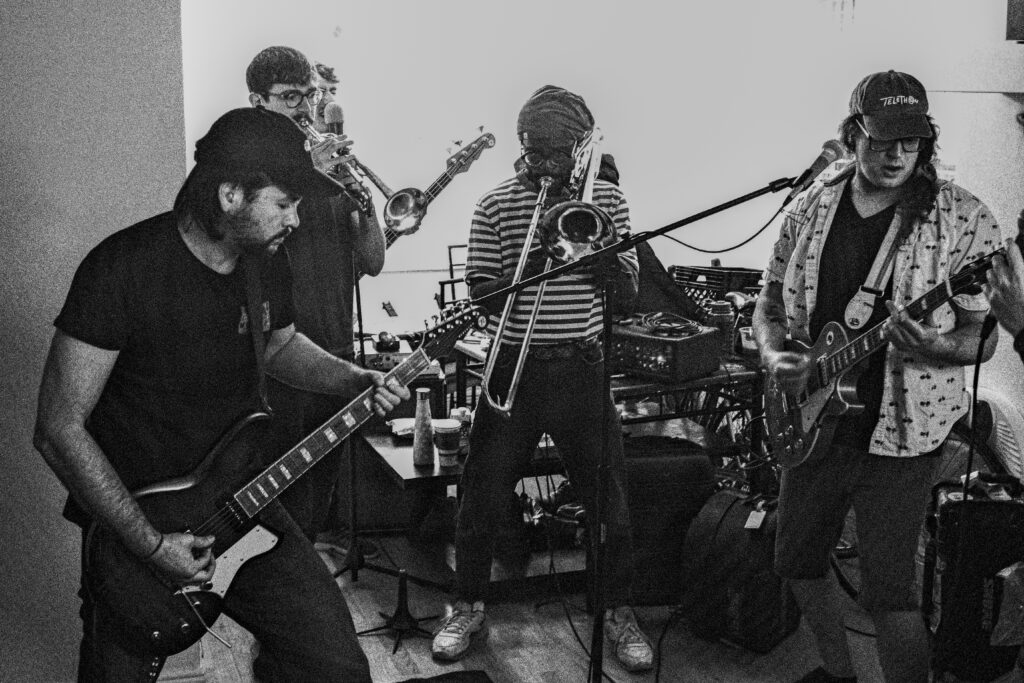
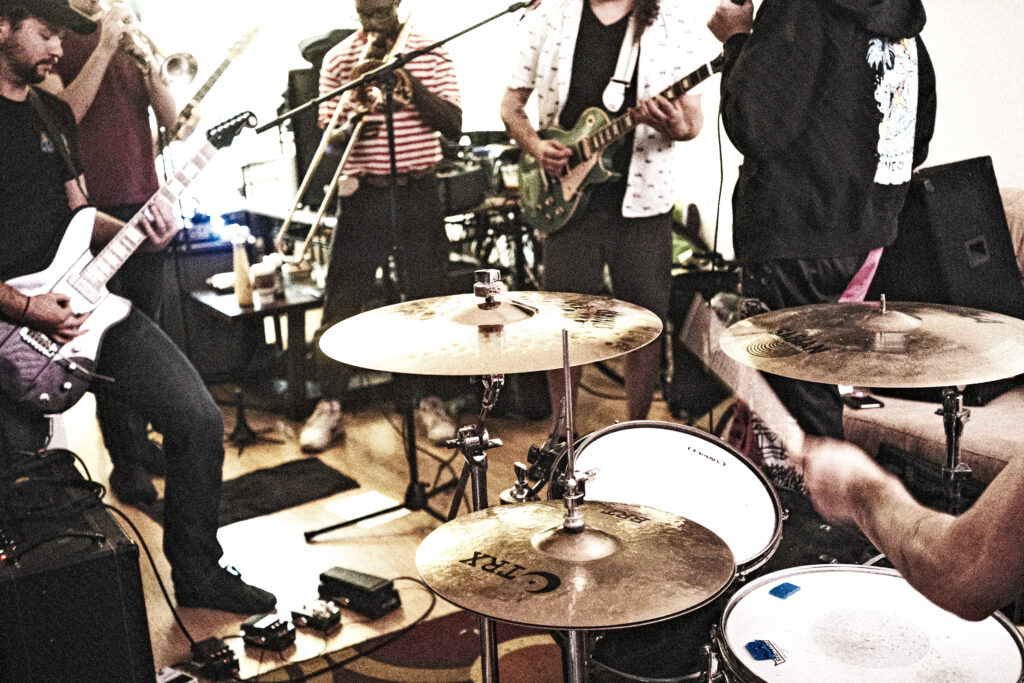
Members of Skatune Network and We Are The Union practiced in Jeremy Hunter’s cramped living room before performing at FEST 19. (Apoorva Thapa/Atrium)
Ricky Weber, guitarist for both projects, stood in front of me.
“This might be pretty boring,” he said. “We’re gonna mess up a lot.”
They didn’t. The band ripped through We Are The Union’s 40-minute set, including songs from their new album, “Ordinary Life,” with few mistakes, despite it being the second time they’d ever played the songs together in the same room. Hunter was dancing almost at once, making use of every inch of the little space they had. The bouncy, joyful rhythms of ska could be heard down the street.
Ska originated in Jamaica in the 1950s and ‘60s, combining the syncopated Afro-Caribbean genres of minto and calypso with rock and roll, jazz and R&B. Ska spread to the United Kingdom in the ‘70s and ’80s and reached quasi-mainstream success in the United States in the ‘90s through bands like Less Than Jake, which formed in Gainesville, and No Doubt. This is referred to as ska’s third wave. The often fast-paced music blended easily with the punk and pop-punk that dominated radio stations at the time, and it was easier for American record labels to market ska-punk bands who abandoned the lyrical themes of social justice and equality on which both ska and punk were founded.
The music coming from some of these ‘90s ska bands, which were many Americans’ only exposure to the genre, could reductively be described as goofy. This misrepresentation, rather than the genre’s musicality or history, became what it was widely associated with. As a result, the genre was ridiculed in the years that followed, a convention of reaching for low-hanging fruit that Hunter and their peers loudly resent and denounce.
I learned this, and much more, from Hunter, who is impressively educated in the history and cultural context surrounding their career. Questioning Hunter about a bit of marching band jargon quickly becomes a crash course in music history. Scrolling through Hunter’s TikTok page, with over 330,000 followers, yields dozens of videos where they address misconceptions about ska (yes, it came before reggae, and yes, it was founded on leftist ideals) and enthusiastically tout their work and that of their contemporaries.
Hunter remains relentlessly busy. The YouTube channel where they compose and record ska covers of popular songs on a weekly basis now has almost 200,000 subscribers. They’ve released 10 albums of covers in the last two years. Among them are “burn the billboard,” covering pop hits, “Greetings from Ska Shores,” covering songs from the video game “Animal Crossing,” and “Skalloween.”
Hunter contributed to the soundtrack for “Steven Universe: The Movie,” based on the popular Cartoon Network show, and is currently working on music for “Craig of the Creek,” another Cartoon Network series. A few weeks after FEST, Hunter debuted JER, their newest project, consisting of original music, live at a handful of shows while on tour with ska-punk veteran Jeff Rosenstock. A full-length JER album is also in the works, set to release in 2022.
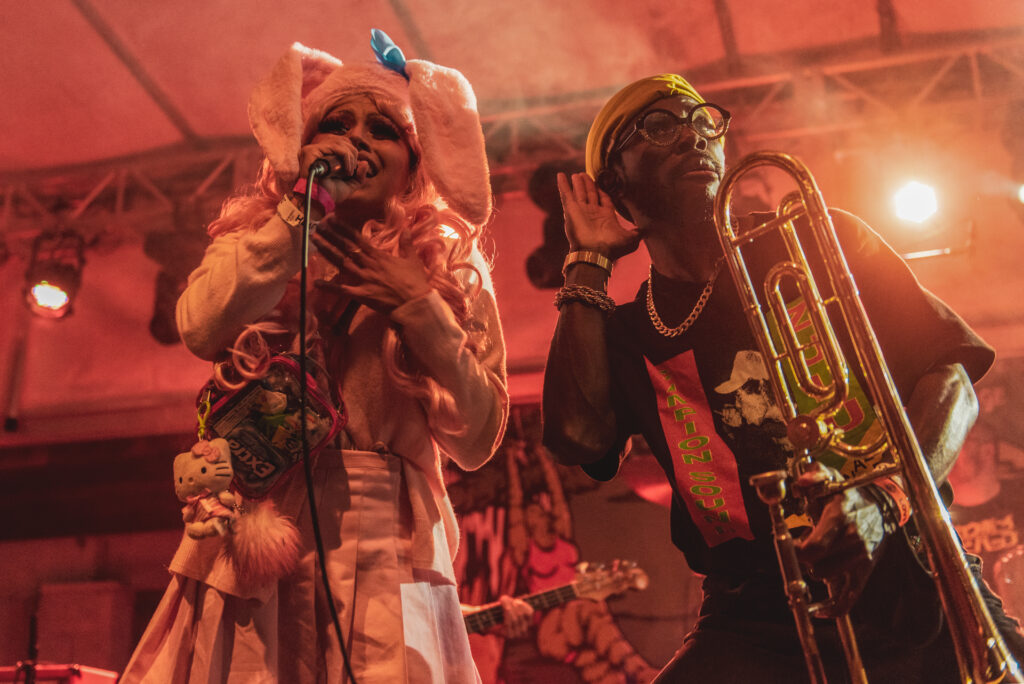
Insignificant Other’s Sim Morales joins Skatune Network onstage at FEST 19. (Photo by Lorien Lamarr)
All of this, in addition to their teaching gig at Santa Fe High School, cycles through Hunter’s mind constantly. What seems like an impossible workload is to Hunter just the life of a musician. Few are lucky enough to get by working a single job.
‘The world won’t end if I mess up’
That particular Thursday, though, was the eve of FEST and the band cramped into Hunter’s living room couldn’t seem to nail down their rendition of American Football’s “Never Meant.”
The Skatune Network band includes members of We Are The Union and a revolving cast of Hunter’s friends and collaborators from around the country, which makes it a challenge to keep everyone on the same page. With “Never Meant,” a somber tune rife with complex melodies and time signatures, they were hardly on any page at all. For the first time that day, three hours into the rehearsal, the band grimaced, staring at their instruments or counting out loud while trying to stay locked in. It was then that Hunter’s experience as a teacher began to show.
Trouble arrived in the middle of the song, when the song’s unusual structure and inconsistent rhythm derailed them. After a few more attempts, Hunter arrived at a straightforward solution:
“I’ll conduct us all on stage at the punk festival,” they said, “I don’t give a shit.” After a few more attempts during which Hunter dramatically waved their arms in time with appropriate beats, the band seemed satisfied.
By then, it was nearly 3 p.m. and the rain had stopped. Santa Fe High School is 30 minutes away, and they hadn’t finished rehearsal. Hunter would just be late, they decided, and played through the rest of the set.
As the band collected their gear, Hunter raced around me, sweeping the living room while eating their lunch. I was anxious just watching, but Hunter was as calm as I’d ever seen them. They felt prepared for FEST, and after 15 years of performing music, they don’t get stage fright.
“When I realized the world won’t end if I mess up, I stopped caring about that,” they said. “Plus, it’s just FEST. If I forget the words, I’ll just…” They extend their arm, mimicking the motion of pointing a microphone at the audience.
Meal eaten and house somewhat tidied, Hunter was almost out the door when they realized their bandmates needed a ride back to their hotel. Hunter was already late, of course they’d drive them. The musicians piled into Hunter’s silver Nissan and zipped down the road, slick with the storm’s remains, toward downtown Gainesville.
Hunter grew up in Broward County and was enamored by ska music as a child upon hearing Less Than Jake on the “Digimon: The Movie” soundtrack. They picked up the trombone in middle school, when their parents made them join their school’s band. In high school, they were introduced to the world of DIY punk when their friends invited them to a show in someone’s house.
Hunter quickly became a fixture of the scene, forming a band of their own and helping book shows in the area. They got a job at the Talent Farm, an all-ages venue in Pembroke Pines that served as a hub for ska, hardcore and punk music in South Florida before closing in 2014. This was the year Hunter first went to FEST, which in part convinced them to move to Gainesville.
They uploaded the first Skatune Network video, a cover of “Feliz Navidad,” in December 2016, mostly as a joke. It gained thousands of views across YouTube and Facebook in a few days, convincing Hunter to continue the project and eventually leading to live performances and an invitation to play at 2019’s FEST. That 28-minute set at Downtown Fats was pandemonium, with the room packed to stifling, sweaty capacity and crowdsurfers hanging from the rafters. If Hunter felt any pressure to live up to that night, they never showed it.
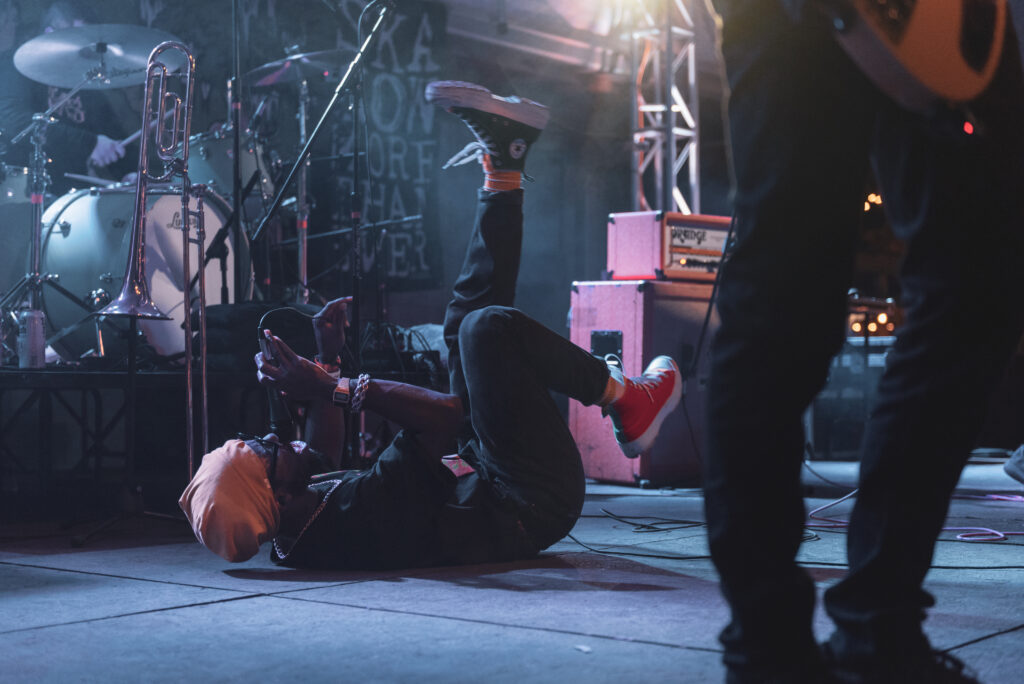
The first night of FEST 19 featured a showcase of current ska bands, including We Are The Union, Skatune Network, Kill Lincoln and Catbite. (Photo by Lorien Lamarr)
I didn’t see Hunter again until Friday night. They were scheduled to perform at Heartwood Soundstage, a large outdoor venue, alongside a handful of other ska bands, all friends of Hunter’s. The weather had cooled down after the previous day’s downpour and FEST was underway, but there was a problem. It was 7:30, and the Skatune Network merchandise table was halfway set up. This should’ve been done hours ago.
Despite this, they were in high spirits when I found them scrambling to set up their assortment of T-shirts, hoodies and vinyl records for sale. While they politely told fans they’d love to sell them something in just a few minutes, they kept an ear on the music coming from the stage. The band Catbite was playing, and Hunter was meant to join them onstage to play trombone during a song. Before long, they heard whatever they were listening for and made their way toward the stage.
Hunter first made a beeline for the mosh pit. Instead of the slamming and shoving characteristic of most mosh pits, the dozens of people before us were dancing. Ska is beautifully, naturally danceable, and after all, it was the first night of FEST. Many of those in attendance might not have seen live music in well over a year. This was a celebration.
I spotted Hunter a few yards away, dancing their way around the circle with a massive grin on their face. I hadn’t noticed them leave my side. Every few moments, they recognized a friend in the crowd and took a moment to greet them with a hug before two-stepping back into the pit.
It was nothing like the indie rock or punk shows I’m used to, where everyone sways gently and bobs their heads, or the outright danger of hardcore shows, where chaotic violence is routine and encouraged. I understood clearly why Hunter and the hundreds of delighted people around us are drawn to ska, just as I understood why the genre is often so cheaply maligned: No one there could have cared less about what is or isn’t cool. Their only concern was having fun.
‘I stalk your TikTok a lot’
Hunter had disappeared again. I found them next to the stage a few minutes later, warming up with their trombone. The volunteers managing the stage nearby danced by themselves. As Catbite started their next song, Hunter leapt up the steps to the stage and was met with a roar of applause.
We Are The Union played an hour later. The crowd had grown, and Hunter’s energy onstage swelled to match it. They refused to stand still. They bounced around the stage singing almost every lyric. The band closed triumphantly with “Morbid Obsessions,” the standout single from “Ordinary Life.”
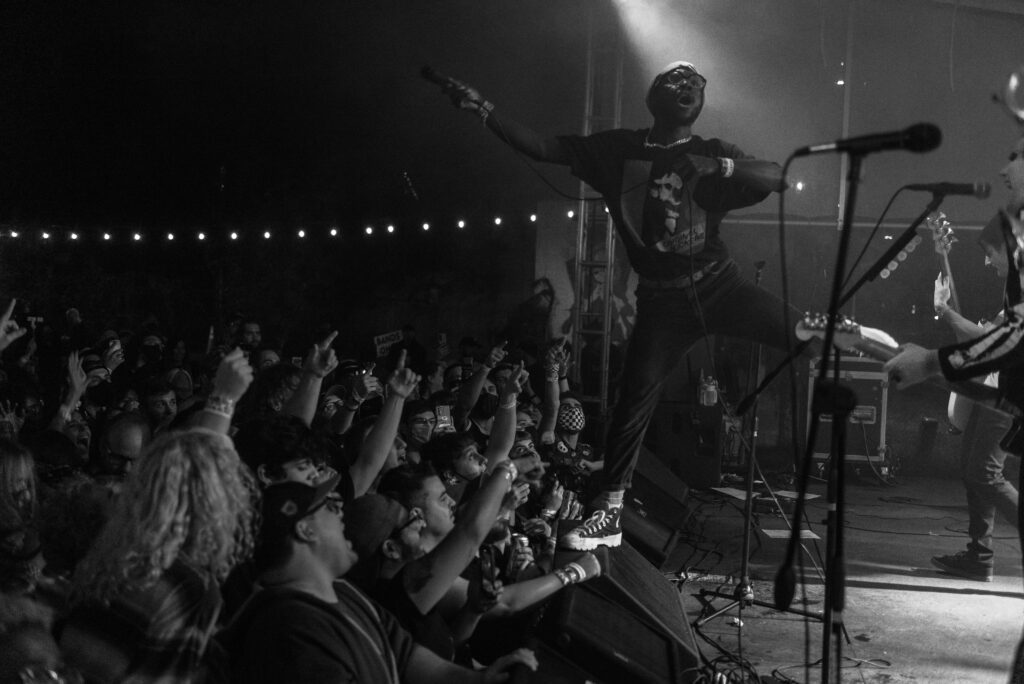
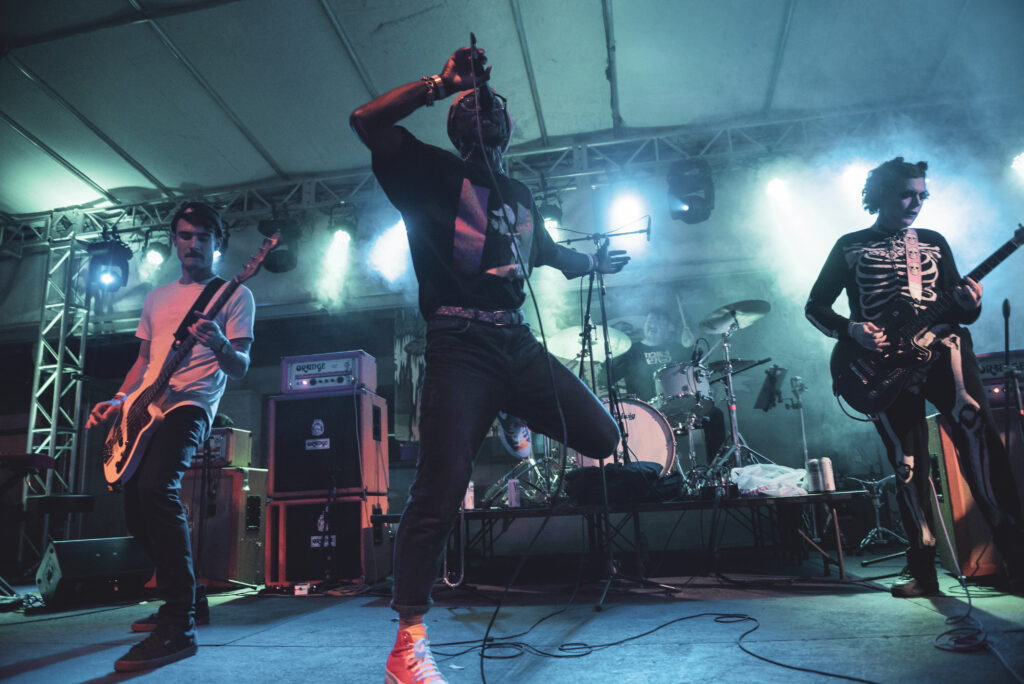
Hunter, who goes by Jer, offered the microphone to the audience at every opportunity. (Photo by Lorien Lamarr)
FEST had never hosted shows at Heartwood before, and technical problems persisted throughout the weekend. Skatune Network didn’t start until 15 minutes after their scheduled time, cutting into their 40 allotted minutes. Hunter paced about the stage, onto which nine musicians fit snugly, tossing out banter while the venue’s crew sorted out an issue with a microphone.
“Are we ready to go? Let’s start this thing. This first one’s an original.”
The crowd’s laughter was drowned out by the band launching into their cover of My Chemical Romance’s “I’m Not Okay (I Promise).” Everyone in the venue seemed to know the lyrics. What followed must’ve been the most eclectic set performed all weekend, including covers of Billie Eilish’s “Bad Guy,” complete with a hardcore breakdown featuring Hunter’s genuinely impressive screams, “Monster Mash” and the theme song from the children’s series “Arthur.” As promised, Hunter offered the microphone to the enraptured audience at every opportunity, unfazed by forgotten lyrics. Friends from other bands hopped onstage to sing, capped off with Paramore’s “Misery Business” sung by Christine Goodwyne of Pool Kids, whose voice is startlingly similar to that of Paramore’s Hayley Williams. Then, it was over.
“That was really rough,” Hunter said a few minutes later, as we walked from the stage to the merchandise booth. The delayed start cut their set nearly in half. We were stopped constantly by fans congratulating them and asking for photos.
Near the bar, we were approached by someone wearing a glittery silver vest. Without speaking a word, they offered Hunter a gift from their fanny pack: a neatly rolled joint.
“Thank you so much,” Hunter said, smiling. “But I don’t smoke. I really appreciate the gesture.”
At the merchandise table, the line to greet Hunter was longer than the line to buy a shirt.
“I adore you,” one person said. “I stalk your TikTok a lot.”
“Both of my children follow you,” a woman said.
Hunter accepted every compliment and took every selfie with a smile. They stood at the table for well over an hour, long after the last band had left the stage. It was past midnight. Hunter told me their back was killing them — they’d strained it at marching band practice a week prior and again tonight, zooming around the stage.
They could’ve sat in a chair while talking to friends and fans. They could’ve ignored them altogether, packing up and going home to rest, but they didn’t. FEST had just begun, and Hunter would take the stage nine more times before the weekend was over.
Hunter’s place in the scene is unlike that of many of their peers. Most play in a band, or several bands, and many of them are online content creators. All musicians are content creators, after all, though they haven’t always been referred to as such. But few are as active in both arenas as Hunter, who is perpetually online, a trait to which they attribute much of their success. The way they see it, this is the way to make it as an artist in 2021. Their first gig with We Are The Union came after they jokingly asked the band on Facebook if they needed a trombone player, and they said yes. Even during Thursday’s rehearsal, Hunter was answering questions from followers on Instagram between songs.
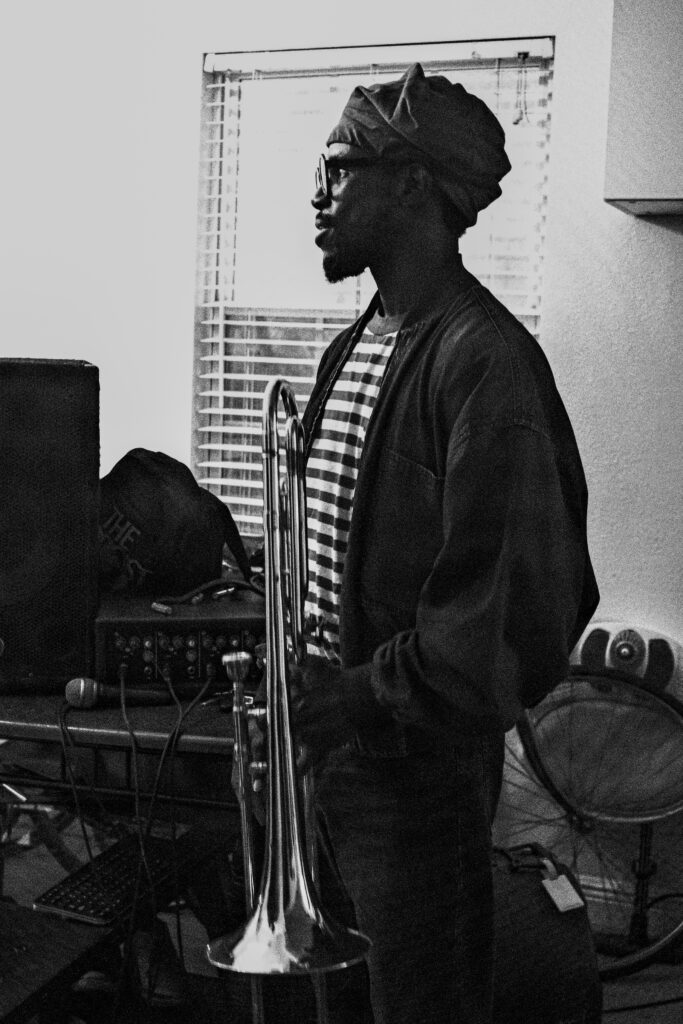
Jeremy Hunter found ska as a child in the soundtrack for “Digimon: The Movie” and was enamored at once. They picked up the trombone in middle school and are now a widely skilled multi-instrumentalist. (Apoorva Thapa/Atrium)
Hunter is often called the “CEO of Ska,” a nickname born in the comments section of their TikToks, though they might more fittingly be called the genre’s chief lobbyist. Their efforts to convince the masses that new and current ska bands deserve support have undoubtedly brought attention to the scene. Their appeal extends to older generations, who loved ska in college and then moved on, as it does to Gen Z, who don’t remember a time when it was cool to make fun of ska.
Hunter also live streams several nights a week on Instagram, TikTok or Twitch, often while working on music. In these streams, they engage with viewers and often spark discussions about music theory, the history of ska and the current ska scene for which they ardently advocate.
Rare is the Q&A session where Hunter isn’t asked about ska’s “fourth wave,” the genre’s mythologized return to the mainstream. With increasing impatience, they explain how that brand of fame no longer exists, as television and radio relinquished the role of spreading music to the internet. It’s easier than ever to find, and even create music — members of We Are The Union are spread across three states — but it’s far more difficult to financially sustain a touring band in 2021. A fourth wave as imagined through nostalgia’s lenses will never come, Hunter says, and waiting around asking for it is a waste of energy better spent supporting the current crop of bands elevating the genre. Hunter and their friends can’t do it alone.
Nearly all my conversations with Hunter’s friends and bandmates began with them praising their musical talent, then shifted to lauding Hunter’s tireless determination to carry the genre’s torch. Nearly everything they do is in service of this. A ska cover of Phoebe Bridgers’s “Kyoto” is a Trojan horse, a trapdoor into the genre masquerading as mere entertainment. (The channel does, of course, also help pay Hunter’s rent.)
Everyone loves ska as far as Hunter is concerned, we just don’t all know it yet.
One night two weeks after FEST, Hunter streamed on Twitch while playing Animal Crossing. A few dozen people watched as they decorated their character’s island, called Ska Shores, while responding to questions from the chat box. The inevitable transpired: Someone, innocently enough, mentioned that they’d never heard of ska before. Hunter began explaining, as they’ve done countless times before. Then the chat box erupted with thousands of pink heart emojis. Instantly, the viewer count jumped from less than 100 to more than 5,000. It was a raid, a common occurrence on Twitch, when one channel’s audience floods to another channel at the end of a stream. It’s meant to build community and expose viewers to new streamers, and it couldn’t have come at a better moment.
“Well, I guess all of you get to hear the history of ska,” they said, laughing, and continued the lesson.